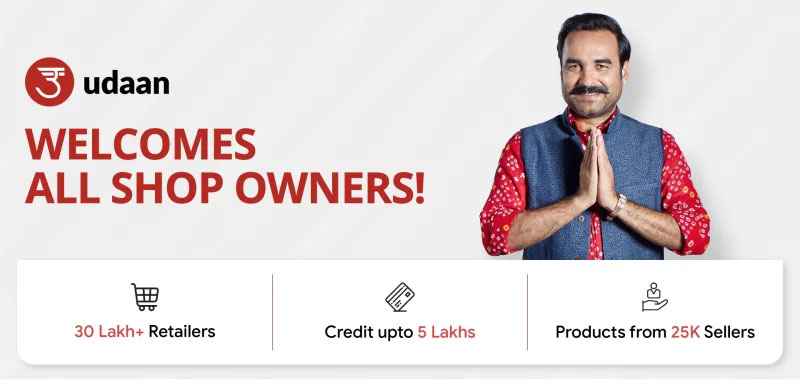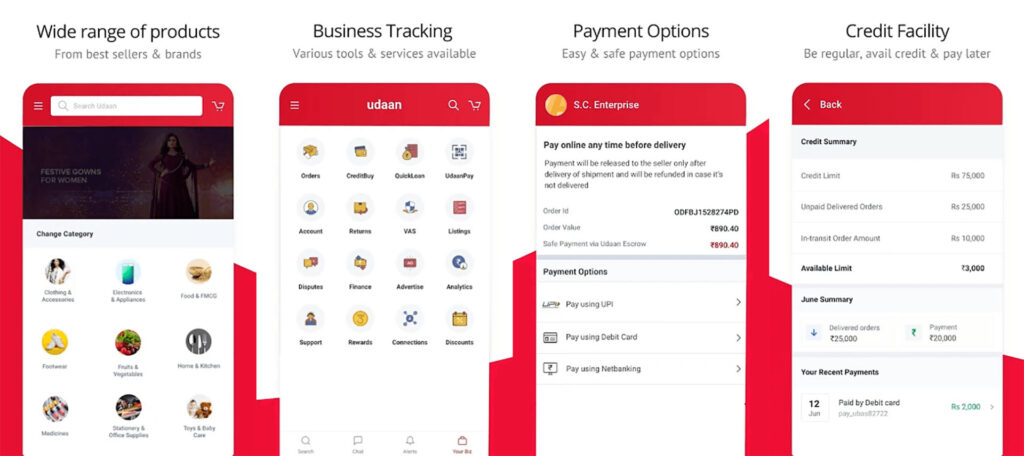For three years, Raju Sahu, a common man, travelled 20kms to buy products for his kirana shop (mom-and pop store). A simple smartphone changed the way he works today.
One fine day, Sahu was approached by a team of local techies, who informed him how he could use his smartphone to source his products for the Kirana shop instead of travelling all the way to the city. The team helped Sahu download an app, learn the application and its usage. Initially hesitant, Sahu’s entire sourcing is now done on his smartphone through that app. And why not? He gets his products on time, has a variety to choose from, returns easily, the price range is affordable, can avail credit and most importantly, has help and advice to grow. Sahu doesn’t have to move places or seek credit from local lenders or wholesalers at a high interest rate anymore. In short, a smooth sailing with just an app.
Now imagine 3 million Sahus (traders, manufacturers, wholesalers and retailers) on that single platform provided by Udaan. That’s an idea for disruption and something to take inspiration from.
‘‘
Within a short span of about 22 months of operations, Udaan had gained a significant foothold in the market. It had been able to onboard about 1,80,000 sellers and buyers on the platform.
The Inception of Udaan: ‘Let’s Build Together’
You are able to understand the problem better when you have first-hand experience of the same and hence come up with better solutions. The Udaan trio, Sujeet Kumar, Amod Malviya, and Vaibhav Gupta, grew up in small towns of Uttar Pradesh and Bihar where shopping was a hassle as they had to travel all the way to the nearby city. They understood the pain point of the customer, the local kirana uncle and the city retailer.
This was the trio’s first inspiration to come up with Udaan’s business model. This was built up during their respective stints in Flipkart where they noticed that the company provides logistics to over 500 cities but their small hometowns were not one of them.
Before the conception of the ‘idea’, the trio of IITs had one thing clear on their minds – to work together. Kumar, who worked as the President of Operation at Flipkart, and Malviya, as Chief Technology Officer, had quit the company in mid-2015. They had gone to visit Gupta – then on a sabbatical as Senior Vice President at Flipkart, Seattle in October 2015 when the brainstorming of creating something disruptive happened.
They had gained enough exposure on the retail market structure, the challenges and the gaps that need to be filled, especially with small business owners. The initial idea was simple – to streamline the B2B market by bringing small traders, retailers, manufacturers and wholesalers on one large single platform and discover the best-value for money and access to a wider selection of catalogue.
In 2015-16, the trio began with their market survey and analysis. They reached out to merchants, retailers, and manufacturers to understand, discuss terms and negotiate besides visiting several wholesale markets across the country to witness the ground action.
It was in February 2016 when the decision to venture into the B2B marketplace had been made. After all the research, the trio launched the beta version of Udaan in November and threw it open for public, announcing a Series A fund-raise of $10 million from Lightspeed Venture Partners at the same time.
A wider launch took place in June 2017 when the company had curated enough users. Udaan, which means ‘Flight’ (metaphorically equivalent to freedom to explore and live to the full potential), began operations as a logistic platform for buyers and sellers in staple, electronic and apparels. This helped the company understand the demand and supply in these categories, to begin with, and build a relationship in that space. They became more aware of ‘who is buying/selling what’, besides building a database of buyers and sellers.
Within a short span of about 22 months of operations, Udaan had gained a significant foothold in the market. It had been able to onboard about 1,80,000 sellers and buyers on the platform and had even set up a team in China for sourcing sellers in apparel, smartphones and electronics. In February 2018, the company had again raised around $3.2 billion from its existing investor Lightspeed Venture and Russian Billionaire Yuri Milner’s Apoletto Fund. Within 7 months, the company announced Series C fund-raise of $225 million from Lightspeed venture and DST Global and became the fastest Indian start-up to reach Unicorn status, soaring to the $1 billion valuation milestone in merely 26 months of registration. This was a record. It took almost four years for similar start-ups like Swiggy, Hike and InMobi to enter the billion dollar club.
The goal of ‘largest variety at the lowest cost’ was achieved. Now, all the manufacturers can present their product on the platform, and interested traders had the freedom to select and buy it. Retailers and wholesalers also had the same freedom to advertise and buy a product with secure payments and logistics.

Marketplace, Logistics, and Lending: A Perfect Marriage!
First came marketplace, then logistics and finally lending. Charging commission on transactions and for logistics was the core source of revenue for Udaan, but not the ultimate. The company was eyeing bigger opportunities through lending and hence becoming a full stack platform for SMEs (Small and Medium-sized Enterprises).
This made sense for the company as the majority of the lending companies in the B2B space focussed on mid sized sellers with credit history, neglecting the smaller merchants. Udaan was sitting on a golden opportunity here with an advantage, especially in comparison to other start ups in this space.
The company had built a pool of knowledge starting from the financial health of small sellers and buyers through their transaction history to understanding their capital requirement and recovery position. Thanks to technology and data, offering loans (working capital for retailers) without additional manpower, was the perfect proposition for Udaan.
In November 2018, Udaan had secured a Non-Banking Financial Company (NBFC) license, to be able to disburse loans to its retailers and sellers. It also provides accounting, order management, and payment management solutions to merchants on its platform.
They provide a credit limit to the only verified buyer that too if is eligible for the limit. At first, they will provide Rs 1,00,00 credit with no interest charges then the credit limit will be increased to a maximum of Rs 2,50,000.
‘‘
Rather than expecting traders to change their traditional ways of doing business and conform with a rigid set of rules, Udaan enabled users to trade the way they want to.
Making Money
As an asset-light company, Udaan’s major source of revenue comes from logistic service. Besides the delivery charges, it also charges fees for collecting any return of sales from the customers. Second is the revenue from storage and warehousing services. Sellers are charged a fee for such services. Third is the fees from receivable collection services which include fees for collecting payments from buyers in cash on behalf of the sellers or fees for accepting payments online on behalf of the seller.
Fourth is the advertisement services it provides to its sellers on its platform where their listings can be promoted with a fee. Fifth is the interest it earns from credit. Interest income from loans is an important source of revenue for the platform. Udaan also earns from other fee-based value-added services like packaging and printing of labels on products, printing of invoices and returns management service.
No CEO: The Power of Decentralisation
The founders did not find any sense in having a CEO for the company. Why? The foremost reason for this was the company’s structure.
The e-commerce platform is a pure-play horizontal marketplace which doesn’t focus on a particular product or a sector. A horizontal structure represents a belief that involving employees directly in the decision-making processes and minimising management supervision of employees increases productivity. For instance, if there is a problem, people do not go looking for an answer. They try to figure out something, and then they start scaling, keeping everybody in the loop.
Designation was never important for the founders. Gupta had once shared his co-founder’s card with a buyer who, quite puzzled, had asked him what a ‘co-founder’ meant. Gupta suddenly sensed a disconnect. So, the next time he went, he gave the buyers a sales executive card, and that worked with them. He was quick to realise that designations do not matter in his field of work.
Nothing Great Comes Easy
To make something successful, especially that big a stature, is no cakewalk. Building B2B e-commerce from the scratch is a challenge in itself, starting from complex logistics to technology integration.
Besides the technicalities, the founders had the biggest challenge of convincing businesses to come online. Weaning small retailers away from local relationships they have built over the years was a tough nut to crack. Targeting tier 1 and 2, the team went on the ground, spoke to retailers, suppliers, and tried to understand their roles before launching their product. Post the launch, the team worked towards building the massive network of 3 million users it has today.
Scaling was also a challenge, given the horizontal structure of the company, whether it was adding new products, building supply chain capabilities or offering credit. Besides challenges in product cataloguing and logistics, the company faced hurdles with respect to payments. In B2B, only two modes of payment work — cash or credit — unlike B2C e-commerce where options of credit cards, debit cards, cash and net banking are provided. Initially, the company failed to model and improvised later.

For Udaan, Timing is Everything
A lot of things played in Udaan’s favour, especially timing. Besides, having an early movers’ advantage against its large rivals, crunching off expensive data prices came as a huge advantage for the company.
Udaan’s major requirement was tech penetration and adoption. In 2016, Reliance had entered the Indian telecom industry with 4G network and smaller towns, especially remote areas, had started to undergo a major change with cheap data and advertisements. A lot of dealers on Udaan’s platform today are first time internet users while some were completely unaware of any other role of a smartphone besides WhatsApp. As soon as the data reached the villages, Udaan took a flight.
The founders also credit some of the success to the 2017 Goods-and-Services (GST) tax. After GST, moving goods across states became much easier and helped solve the logistics issues which were driven by multiple rates and high compliance costs. When Udaan had started out, majority of the players in the B2B segment were vertically focussed like Power2SME in industrial products and Bizongo on packaging materials while horizontal platforms like ShopX, Wydr had not gained enough momentum and were still figuring out the unorganised market.
Besides the idea, handwork and execution, Udaan had money. The start-up had managed to duck most of the challenges due to its massive war chest. With reach, scale, ambition and finance, Udaan was able to put things at place and became the leader of the pack.
What They Did Right
Initially, the company did not charge almost anything for the logistics. Doing logistics at subsidised rates gave the company gain sufficient exposure within the community besides the right market share.
Most of the start-up launch the app first and then go about validating the same. Udaan did the opposite. It first made its product relevant enough to be accepted and launched the beta version before the official launch. They spoke the language of their target audience, kept themselves abreast with the ground realities. Rather than expecting traders to change their traditional ways of doing business and conform with a rigid set of rules, Udaan enabled users to trade the way they want to.
Above all, a strong founding team was the company’s most valuable asset. The team members, majorly comprising ex-‘flipkartians’, were best at what they did — logistics, supply chain, product development, management, IT, etc. They had quit their jobs and extended support with the founders’ trio and implemented the best practices they had learnt over years at Flipkart, only with slight change in focus towards smaller towns.
Udaan has taken over 80% of the B2B e-commerce market, delivering goods it stocks in 200 warehouses to more than 1.7 million retail stores in 900 cities everyday. The company kickstarted the year 2021 with a fund-raise of $280 million from new and existing investors as the start-up builds a war-chest to accelerate its growth and fend off rivals. The company’s valuation stands at $ 3 million post investment.
There are often talks about Udaan taking on the likes of Amazon, Flipkart and Jio Mart. However, front-end retail is not even on the focus list of the company, which is eying a much bigger lucrative opportunity in B2B e-commerce. The per-unit profitability in B2B e commerce is five times that of B2C e-commerce and eight times the market size. Udaan is at the forefront of this ‘uniquely Indian’ e-commerce opportunity.




